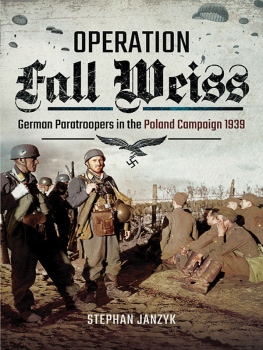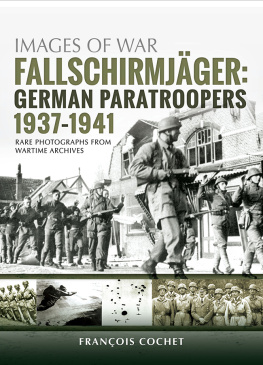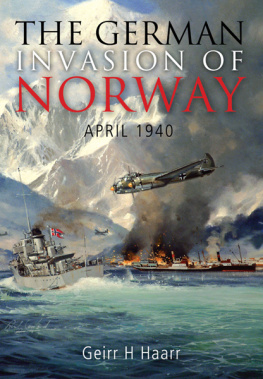
OPERATION
FALL WEISS
GERMAN PARATROOPERS IN THE POLAND CAMPAIGN, 1939
OPERATION
FALL WEISS
GERMAN PARATROOPERS IN THE POLAND CAMPAIGN, 1939
STEPHAN JANZYK
Translated by Susan Haynes-Huber
Originally published by VS Books Torsten Verhlsdonk in 2015 as
Deckname Fall Weiss
Deutsche Fallschirmjger im Polenfeldzug 1939
First published in Great Britain in 2017 by
Pen & Sword Military
An imprint of
Pen & Sword Books Ltd
47 Church Street
Barnsley
South Yorkshire
S70 2AS
Copyright Stephan Janzyk, 2017
ISBN 978 1 47389 461 7
eISBN 978 1 473894 631
Mobi ISBN 978 1 473894 624
The right of Stephan Janzyk, to be identified as Author of this work has been asserted by him in accordance with the Copyright, Designs and Patents Act 1988.
A CIP catalogue record for this book is
available from the British Library.
All rights reserved. No part of this book may be reproduced or transmitted in any form or by any means, electronic or mechanical including photocopying, recording or by any information storage and retrieval system, without permission from the Publisher in writing.
Pen & Sword Books Ltd incorporates the Imprints of Pen & Sword Books Archaeology, Atlas, Aviation, Battleground, Discovery, Family History, History, Maritime, Military, Naval, Politics, Railways, Select, Transport, True Crime, Fiction, Frontline Books, Leo Cooper, Praetorian Press, Seaforth Publishing, Wharncliffe and White Owl.
For a complete list of Pen & Sword titles please contact
PEN & SWORD BOOKS LIMITED
47 Church Street, Barnsley, South Yorkshire, S70 2AS, England
E-mail:
Website: www.pen-and-sword.co.uk
Acknowledgements
First of all, I would like to take the opportunity to thank those people without whom this book would probably never have been written. I owe a particular debt of thanks to my fellow collector and supporter, Sven Jordan. Thank you for your help with our mutual hobby and for the many, many pleasurable hours spent talking shop. I would also like to thank the following collectors and historians: Edgar Alcidi, Marc Branzke, Hugo F. van Dijk, Philipp Engels, John Hodgkin, Chris Mason, Eric Queen, Gustav Skvaril, Thomas Steinke, Sren Szameitat and Shaun Winkler.
Thank you, too, to the ever-courteous and ever-helpful staff of the Federal Archive in Freiburg. Our many telephone calls and your intensive research made this book possible. Furthermore, I would like to thank the publishing house VS-BOOKS for the realisation of this project and for our successful collaboration.
And last but not least, I thank my wife and family for their patience and understanding, because we all know a hobby and project like this eats up a lot of time.
Stephan Janzyk
Introduction
Historical background
In the 1920s, following the end of the First World War in 1918 and the associated changes in national boundaries, which were in part stipulated by the Treaty of Versailles, many high-ranking politicians and statesmen saw the hope of a peaceful future already dwindling.
British Prime Minster Lloyd George, for example, stated in 1919: Redrawing boundaries in the East, placing more than two million Germans under Polish control, must, in my judgement, lead sooner or later to a new war in the East of Europe.
In the Weimar Republic, foreign minister Gustav Stresemann and well-known Social Democrat and Prime Minister Otto Braun also attempted to defuse this potential source of conflict, first, with the approval of the French and British governments, by entering into renegotiations with the Polish heads of state. When these negotiations repeatedly failed, as Poland was understandably wary of a Weimar Republic which was becoming increasingly strong, France and Great Britain began to recognise and confirm the new boundaries.
With the beginning of the Great Depression in 1929 and the problems it brought with it for relations between states, the National Socialists seized their opportunity. An extremely nationalistic and aggressive political programme enabled them to seize power in Germany by 1933.
The social-Darwinist and geo-political aims they proclaimed found favour with a large proportion of the population. As a result of the Dolchstolegende , for example, the stab-in-the-back myth which claimed that the German Army had, in fact, remained undefeated in the field in the First World War, or as a result of high unemployment resulting from the Great Depression, many saw the Treaty of Versailles and Germanys position within Europe as an extreme injustice that could only be remedied by means of a tough and expansionist policy under a strong leader.
Next page











